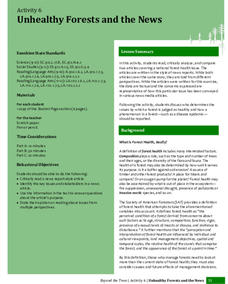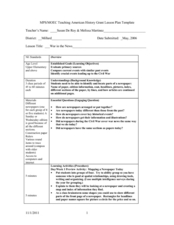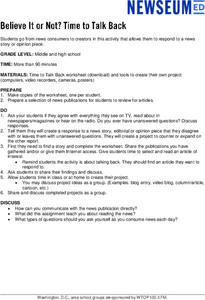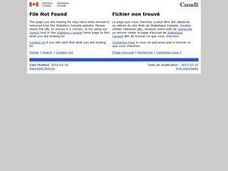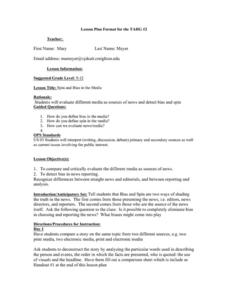Facing History and Ourselves
#IfTheyGunnedMeDown
As part of their continued investigation of the reporting of the shooting of Michael Brown class members analyze photos of Michael Brown and the social media response to these images. The class then develops a guide they...
Curated OER
Bias and Crime in Media
Critical thinking and social justice are central themes for this resource on bias and crime in media. The class views and discusses an incisive PSA that highlights assumptions based on race. Small groups read newspaper opinion pieces...
Social Media Toolbox
Social Media Plan
It's gameplan time! Journalism scholars create a social media plan based upon work completed in previous lessons. The activity, fifth in a 16-part Social Media Toolbox series, focuses on using data and consensus to create an effective...
Social Media Toolbox
Social Media Messages
What are the elements of a good social media post? The 13th activity in the 16-part Social Media Toolbox incorporates all of the typical components found in a Facebook or Twitter post. Scholars work together to create great posts based...
Curated OER
The News Behind the Story
What a fun way to analyze plot, setting, and character. Learners review story elements, read a short fictional story, then turn the events of that story into a headlining news paper article. Not only does this lesson engage critical...
Newseum
Journalists Code of Ethics
Journalists are supposed to adhere to a Code of Ethics. To determine the degree to which reporters follow this code, individuals select three recent stories with photographs from newspapers, magazines, online news sites, or television...
Curated OER
War and the Media Press Freedom vs. Military Censorship
Students analyze the relationship between war and media. In this media awareness instructional activity, students listen to their instructor present a lecture on freedom of the press and military censorship. Students participate in an...
University of Florida
Unhealthy Forests and the News
Everyone knows a tree makes a sound when it falls, but what do we know about dying trees? Class members learn background information about Laurel wilt disease from a teacher-led presentation. Team members work with partners to read and...
Newseum
Civil Rights News Coverage: Looking Back at Bias
Not all southern newspapers covered the civil rights movement of the 1950s and 1960s. Young journalists investigate how The Lexington (Ky. Herald-Leader and The Jackson (Tenn.) Sun re-examined their coverage of the movement. After...
Newseum
Photo Ethics: News Independence
Young journalists read a case study about an annual school tradition of a streaker running across the football field after the homecoming game. Small groups then decide whether or not to cover the story and whether or not to include a...
Curated OER
The World in 22 Minutes: Constructing a TV News Lineup
Students examine several newspapers to compare front pages, headlines, and photographs, experience role of news editor, define and discuss factors that go into news judgements, and arrange twenty-two minute news broadcast by selecting...
Curated OER
War in the News
Pupils consider the portrayal of war in the news. In this lesson plan on Journalistic perspectives, students will work in groups to critically examine news articles written during war times throughout history.
Newseum
Believe It or Not? Time to Talk Back
Young journalists select a news story, editorial, or opinion piece that they disagree with or one that leaves them with questions. They then create their report in response and share it with the class.
Curated OER
Writing a Newspaper-Style Article
Help your secondary reader/writers assess texts by studying press releases from Statistics Canada and drafting articles based on them. They then compare the press release, their own articles, and actual news stories they find online. I'd...
Curated OER
Staying Informed
Students identify the various ways the American public can stay informed on the news. In groups, they brainstorm reasons why the public should not stick to one source for their news. They use this information to examine their own current...
Newseum
Is This Story Share-Worthy?
Young journalists use a "Is This Story Share-Worthy?" flowchart graphic to decide whether a story is worth sharing online. Instructors provide groups with fake news, poor quality stories, opinion pieces, biased news, and high-quality...
Newseum
Bias Through History: Analyzing Historical Sources
Young journalists use the E.S.C.A.P.E. (evidence, source, context, audience, purpose, and execution) strategy to evaluate historical and contemporary examples of bias in the news. The class then uses the provided discussion questions to...
Media Smarts
Media Awareness Network: Hate or Debate?
Discuss the difference between legitimate debate on a political issue and arguments that are based on hate through a science-fiction scenario that shows how a controversial issue can be discussed in both ways. Then learn how purveyors of...
Southern Poverty Law Center
Analyzing How Words Communicate Bias
Words are powerful ... can your class choose them wisely? Scholars evaluate news articles to discover the concepts of tone, charge, and bias during a media literacy lesson. The resource focuses on recognizing implicit information and...
Social Media Toolbox
Twitter Time
Tweet all about it! Junior journalists explore the Twittersphere to determine its effectiveness as a news broadcasting tool in the 12th installment of the 16-part Social Media Toolbox. Participants follow and record their observations of...
Social Media Toolbox
About Facebook
If everyone is on Facebook, should the school's news publication be as well? Scholars study a social media giant in the 11th lesson plan from The Social Media Toolbox's 16-part series. The activity combines individual study and...
Curated OER
Find The Hidden Message: Media Literacy in Primary Grades
Learners practice listening to and reading various types of media and text. In groups, learners use video, newspapers, magazines, and more to compare and contrast different types of information. They identify the differences between fact...
Curated OER
Spin and Bias in the Media
High schoolers compare different types of media. In this media comparison lesson plan, students will assess the where all types of media gets its information by viewing a video of a news story and critiquing it.
Curated OER
Using Print Media in the LCTL Classroom
Explore newspapers as a form of print media. They examine headlines from newspapers and infer meanings of the headlines. They skim articles for information and exchange articles between groups. They complete charts while skimming the...









